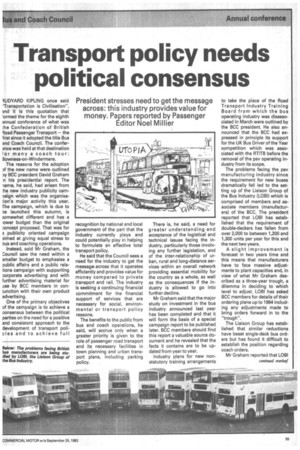Transport policy needs political consensus
Page 39

If you've noticed an error in this article please click here to report it so we can fix it.
RUDYARD KIPLING once said 'Transportation is Civilisation", and it is this quotation that 'ormed the theme for the eighth annual conference of what was he Confederation of British Road Passenger Transport — the first since it adopted the title Bus and Coach Council, The conferance was held at that destination f or many a coach tour: Bowness-on-Windermere.
The reasons for the adoption of the new name were outlined Dy BCC president David Graham n his presidential report. The lame, he said, had arisen from he new industry publicity campaign which was the organiselion's major activity this year. rhe campaign, which is due to Pe launched this autumn, is 3omewhat different and has a lower budget than the original concept proposed. That was for 3 publicity oriented campaign aimed at giving equal stress to I:■us and coaching operations.
Instead, said Mr Graham, the Council saw the need within a 5maller budget to emphasise a public affairs and a public relations campaign with supporting Corporate advertising and with further advertising material for use by BCC members in conunction with their own product advertising.
One of the primary objectives of the campaign is to achieve a consensus between the political parties on the need for a positive and consistent approach to the development of transport polici e s and to achieve full recognition by national and local government of the part that the industry currently plays and could potentially play in helping to formulate an effective total transport policy.
He said that the Council sees a need for the industry to get the message across that it operates efficiently and provides value for money compared to private transport and rail, The industry is seeking a continuing financial commitment for the financial support of services that are necessary for social, environmental or transport policy reasons.
The benefits to the public from bus and coach operations, he said, will accrue only when a greater priority is given to the role of passenger road transport and its necessary facilities in town planning and urban transport plans, including parking policy. There is, he said, a need for greater understanding and acceptance of the logistical and technical issues facing the industry, particularly those involving any further legislation, and of the inter-relationship of urban, rural and long-distance services within an overall network providing essential mobility for the country as a whole, as well as the consequences if the industry is allowed to go into further decline.
Mr Graham said that the major study on investment in the bus industry announced last year has been completed and that it will form the basis of a special campaign report to be published later. BCC members should find this report a valuable source document and he revealed that the facts it contains are to be updated from year to year.
Industry plans for new nonstatutory training arrangements to take the place of the Road Transport Industry Training Board from which the bus operating industry was disassociated in March were outlined by the BCC president. He also announced that the BCC had expressed in principle its support for the UK Bus Driver of the Year competition which was associated with the RTITB before the removal of the psv operating industry from its scope.
The problems facing the psv manufacturing industry since the requirement for new buses dramatically felt led to the setting up of the Liaison Group of the Bus Industry (LOBI) which is comprised of members and associate members (manufacturers) of the BCC. The president reported that LOBI has established that the requirement of double-deckers has fallen from over 2,000 to between 1,200 and 1,300 units per year for this and the next two years.
A slight improvement is forecast in two years time and this means that manufacturers have to face massive adjustments to plant capacities and, in view of what Mr Graham described as a three-year trough, a dilemma in deciding to which level to adjust. LOBI has asked BCC members for details of their ordering plans up to 1984 including any adjustments made to bring orders forward in to the "trough".
The Liaison Group has established that similar reductions have beset single-deck bus orders but has found it difficult to establish the position regarding coach orders.
Mr Graham reported that LOBI












































